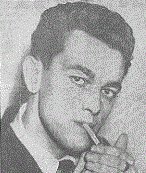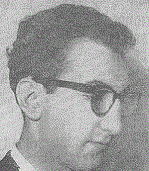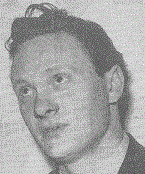










          |
| Snapshot from the Melody Maker (1952)... |
 |
| The "Melody Maker" was the leading weekly music paper and the clips below from March give an essence of the jazz scene of the day. | |||
|
Melody Maker March 22, 1952 (Extract...) His name is Vic Ash. Partnering him in the critics' Top Three selection are pianist Ralph Dollimore and altoist Geoff Taylor. All three names were put forward independently by critics Edgar Jackson, Steve Race, Maurice burman and Mike Nevard. Meeting to discuss their selection the critics added the names of tenormen Gray Allard and Jimmy Walker and trombonist Ken Wray. There were other names that could have been incorporated, too, some of them sure bets for the future. But the aim of the panel was to pick out those musicians who had so far had little chance to prove themselves, yet who were nevertheless their prediction for musical stardom in the coming year. Pianist Dollimore  The "baby" of the six is Ralph Dollimore. While still at school he played Chopin in a 'Monday Night at Eight' broadcast. After leaving school he went to work for Boosey and Hawkes before joining the Army.
The "baby" of the six is Ralph Dollimore. While still at school he played Chopin in a 'Monday Night at Eight' broadcast. After leaving school he went to work for Boosey and Hawkes before joining the Army.His Army service included two years in a staff band.On leave a year ago he sat in with Kenny Graham's Afro-Cubists at Kingston. Kenny saw his possibilities and signed him as soon as the Army released him. More... Clarinettist Ash  Though Vic followed up that borrowed clarinet with one he bought himself he also plays extensively on alto and did so recently with Kenny Baker's group.
Though Vic followed up that borrowed clarinet with one he bought himself he also plays extensively on alto and did so recently with Kenny Baker's group.but it is his clarinet playing that has brought him to the attention of jazz critics round the London clubs where he has already established quite a reputation for himself. He dropped the salesman job in 1948 to play with a pick-up group in Piccadilly round up and has had spells with Eddie Thompson, Kenny Baker and Nat Gonella. More... Altoist Taylor  Another London boy, and although he was gigging in London and Essex seven years ago it was only a few months ago that Steve Race discovered him on a chance visit to the Robin's Nest at Hornchurch.
Another London boy, and although he was gigging in London and Essex seven years ago it was only a few months ago that Steve Race discovered him on a chance visit to the Robin's Nest at Hornchurch.Within a matter of weeks he hade made a successful broadcasting debut in 'Jazz for Moderns'. He had been playing clarinet and it was not until 1948 that he began to grapple with modern jazz and develop his alto playing. Even now he is still a semi-pro and spends most of his time at Boosey and Hawkes. More... Trombonist Wray When he was 16 he went to the Manchester College of Music for two years before deciding to try dance music. At 19 he joined Teddy Foster and then had 18 months with Joe Loss followed by two years with Oscar Rabin. He quit the business last year complaining there was no chance to play jazz with the big bands but returned to London nine weeks ago to join Teddy Foster. More... |
Melody Maker March 22nd, 1952 case of apathy on the modern front as Ernest Borneman asks: Don't these Modernists care at all? It is eight months now since Mike Butcher sent to the MM the memorable letter in which he criticised the NFJO for having placed too much emphasis on last years traditional Festival Hall concert and having paid insufficient attention to the selection of modern musicians. Challenging the New Jazz society to take over where the NFJO had failed, he set off a controversey which kept the MM's letter columns busy for weeks after. Derek Young, one of the sponsors of the NJS, replied by saying that his organisation could not really do very much more than the NJFO because "there was complete apathy towards modern jazz in the country. Most of the people who go to modernist clubs go there because they want to dance and when any positive action is called for they quietly fade away." The NFJO decided that this year.... it would send a letter to all modernist member clubs of the NJFO for their suggestions on artists to be featured at this years modern Festival Hall concert. By the deadiline reply date, as if to confirm last year's pessimism, not one reply had been received. A week after the dead-line date eight out of the 29 clubs approached had replied, and out of those eight one "felt unable to make any helpful suggestions," while two merely expressed their consent to the NFJO's suggestions. Are these really representative? And the few suggestions received - are they fully representative of modernist opinion? How will we ever know? With modernist clubs representing little more than a fragment of the total modernist movement in the country, how can we be sure 30 NFJO member clubs with modern taste be representative of the thousands of unorganized ticket buyers who may want to hear the Festival Hall concert. And how about the various modern jazz clubs which have so far found it inadvisable or unnecessary to join the NFJO? What I want to know is this: "Why don't more modern clubs join the NFJO? And why don't those clubs who have joined make their will known to the Central committee of the NFJO?" "Perhaps the answer is in the nature of the music. Modern jazz as opposed to traditional is essentially non-conformist....there is no reason why bop fans should wish to share their secret pleasures with others. Every man on his own, and to the Devil with collective improvisation." Cool in two ways? A daring young man on a semantic fling might even go so far as to wonder whether the modern terminology ("cool" ; "crazy" ; "gone" etc) may not be indicative of something more than a search for new and highly sectarian forms of slang. If you are cool about music you are likely to be cool about forming clubs or answering letters. If you're crazy, we can't expect reliance from you. And if you're gone, why then the post office will just have to send the NJFO's inquiries back to the sender - unopened, unanswered, unattended. Can you tell me why there is so much more desire to organise more and better music among traditionalists, and so little among the modernists? I'm willing - no eager to learn. Incorporating "Rhythm" Editor: Pat Brand |
Melody Maker March 22nd, 1952 Bowing to fans' wishes with eight brass, five sax team "Well, I have bowed to their wishes. And as I can only do justice to Kenton arrangements with a full line-up. I have reformed with a star personnel of five trumpets, three trombones, five saxes, three rhythm and vocalist." "This present policy does not mean, however, that I intend abandoning ballroom work. I shall still play for the dancers - but I also hope to carry out a great many concert engagements, when I propose featuring the special Kenton arrangements I brought back with me from the States." The orchestra plays it's opening date at the Town Hall, Dudley, on Wednesday, April 2. Vic's first London concert will be staged at the Gaumont State, Kilburn, on April 20. AFM TO ADMIT RONNIE BALL NEXT JULY... NEW YORK, Monday - Ronnie Ball, outstanding British pianist who arrived here as an immigrant on January 20, is busy studying with Lennie Tristano. He is working on a day job until acquisition of his Local 802 card enables him to start work as a musician in July. A British jazz group will, after all, be heard at the Paris Jazz Fair. Last minute negotiations resulted in the booking of an All-Star Quintet headed by Poll winners Ronnie Scott and Vic Feldman. They will be joined by Tommy Pollard, Lennie Bush and Tony Crombie. A A A A A A A A A A A H FABULOUS Feldman Club EXCLUSIVE Tony Kinsey Trio at all sessions. Sat: Straight from "JFM" Broadcst: The GeraldoSwing Stars. Sun: Five Hours Bop, 5.30-10.30. Definite appearance Terry Brown Group; Tony Kinsey All-Stars, Derek Humble, Ken Sykora, etc. Wed: By demand! The Ralph Sharon Sextet. Resident "JFM" compere Tony Hall. Phenomenal success! CAB KAYE, RALPH DOLLIMORE Trio, etc. Sunday 11.30-2 pm. ACADEMIC! MONDAY'S ARISTOCRACY! Derek Humble, Fred Perry, Bruce Turner, Jimmy (Nut) Skidmore, Danny Moss, Leon Roy, Lennie Bush, Dave Davani, Roy Jackson, Ronnie Roullier, Freddy Harper, Mac Minshull, Ronnie Heasman, Ray Dempsey, Ken Sykora. - "Prince Wales" (minute Ravenscourt Tube). |
|